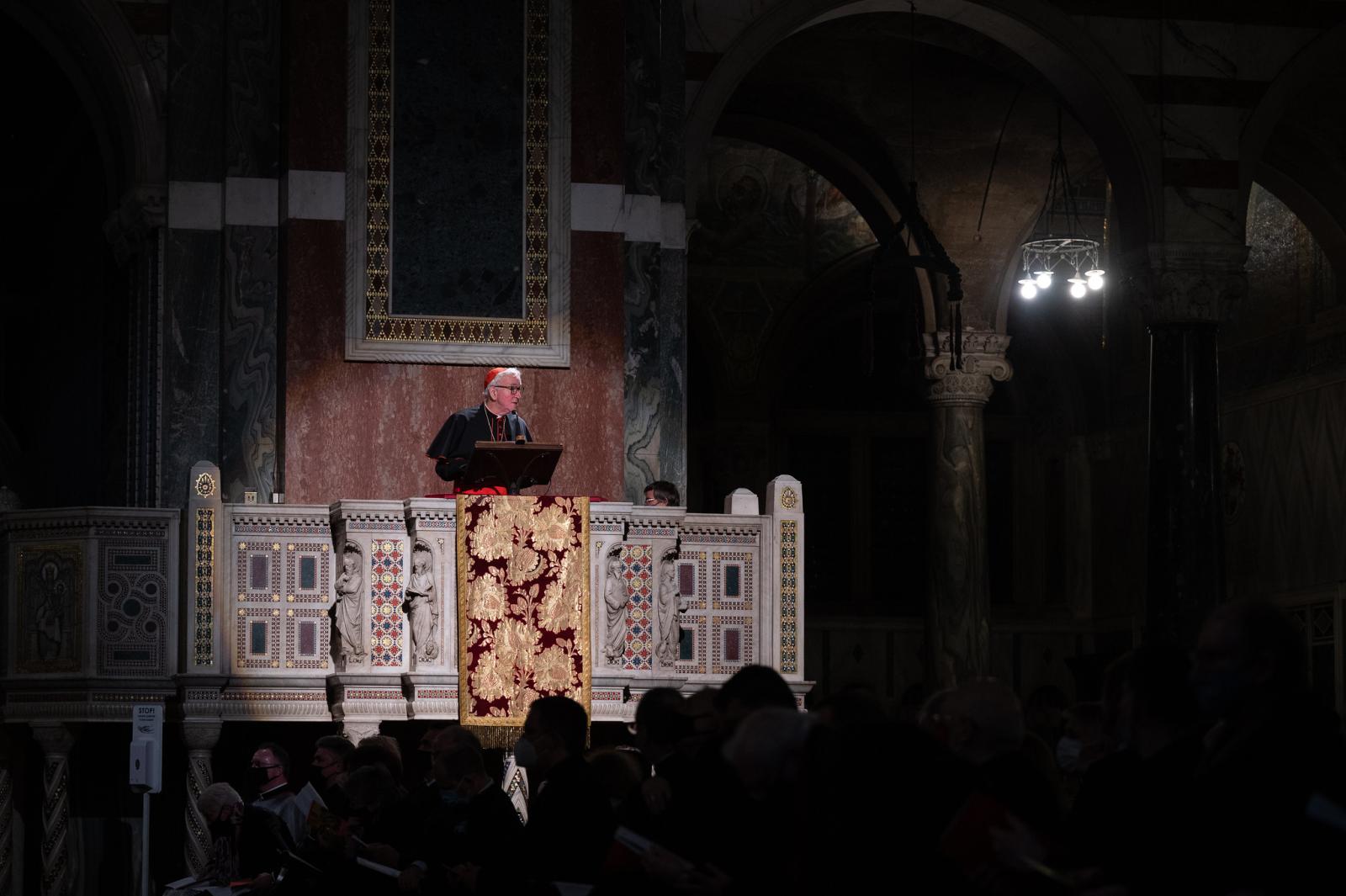Given at the Christmas Celebrations in Westminster Cathedral on 20th and 21st December 2022
There is darkness. And there is light. The resolute affirmation of our faith is that, no matter how dark it may be, the darkness does not, cannot, overcome the light.
But it is dark. Our world is darkened by fear, by hostility and warfare, by anxiety and by dread of the next hardship.
Whence comes this darkness? What is its source?
One attempt to explain, whispered by the Holy Spirit, is found in the Book of Genesis. It tells us that, really, we were created for harmony, living in a fruitful garden, in original goodness. But action of deliberate defiance against the author of such beauty brought discord and antagonism to that Eden. Adam and Eve are the protagonists: names for us all. From within their hearts come the actions, which shatter the bond with their maker, with one another and with nature itself. We read: ‘Cursed be the ground because of you……With the sweat of your brow shall you eat your bread’ (Genesis 3:18-19). And so we do!
But now there comes a second Eve and a second Adam: Mary, the Mother, and Jesus, the Christ. They are untouched by that original sin and by their freely given cooperation, a new horizon appears in the darkness. Mary says: ‘Let it be done to me according to your Word’ (Luke 1:38). Jesus is humbler yet and obedient even unto death, death on a cross.
From this fragile moment of his birth, which we recall and celebrate together this evening, a new prospect emerges, the vision of restored relationships between former antagonists, the possibility of swords turned into ploughshares, the restoration of harmony between the created world and humankind. This is a vision for which we cry out every time we pray ‘Thy Kingdom come’. We beg for the means to fulfil this vision: ‘Give us this day our daily bread’. And we long for its fulfilment: ‘For thine is the Kingdom, the power and the glory. Amen’.
But how can just one night and one small light open up so broad a vision? Here is the mystery: that the entire power and presence of God, the eternal Word which holds all things in being, enters our poor patch, disdaining none of it, so that the work of that first creation, radically tarnished in Adam and Eve, may be repaired and restored in Mary and Jesus. And all from a cold cave, in an outpost of Roman power, surrounded by shepherds and the smell of the sheep.
How much we need his coming! Yes, in our families and circles of friendship, so easily broken by our waywardness! Yes, in our search for a new ecological order in which the resources of nature have to be cared for, in our every action, yet we think it is no more than an issue of technology. Yes, in our response to the 50 million people caught in modern slavery. Yes, above all, in the privacy of our hearts, where good and evil, the honourable and the shameful, battle it out. Yes, we need his coming indeed! We mark his coming again tonight.
Yet familiarity diminishes our expectation; weariness easily leads to cynicism. We need to lift up our hearts once again, and welcome him afresh. And in this, music serves us so well.
Our next piece of music is my favourite: ‘O Holy Night’. So often it brings tears to my eyes. Let me tell you just a little about it.
In 1847, a wine merchant, Placide Cappeau, an atheist, was invited by his local parish priest to write a poem for Christmas. The music was composed by Adolphe Adam, a man of Jewish ancestry, well known for his operatic music. The carol immediately became very popular. But, because of its unconventional origins, Church authorities in France deemed it ‘unfit for church services’. Its popularity remained undimmed. Then, the story goes, on Christmas Eve in 1870, during the Franco-Prussian war, it was sung by a brave French soldier, standing in no-man’s land, unarmed. This provoked a like response from a German soldier and a Christmas truce ensued. The story does not end there. For in 1906 this beautiful carol, ‘Cantique de Noël’, was the first piece of music ever to be transmitted live by radio signals.
Permit me to read one verse in a more literal translation of the original French. In its proclamation of the coming of our Redeemer, this translation has more punch. With his coming,
‘The earth is free, and heaven is open.
For he sees a brother where there was only a slave;
Love unites those that iron had chained.
Who will tell him of our gratitude?
It’s for all of us that he is born,
That he suffers and dies.
People, good people, stand up, stand up,
And sing of your deliverance.'
Yes, stand up we shall. And we shall sing of our deliverance. And this joy we will carry forth in our hearts to a world crying out for this great gift. Amen.
✠Cardinal Vincent Nichols
Archbishop of Westminster
Photo: Mazur/CBCEW.org.uk
